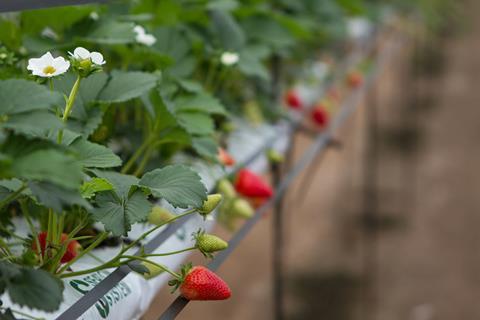
For several years berries have been a hero category for UK retailers, with double-digit sales growth continuing to drive increases in production. But for all the optimism surrounding the category, there is now an underlying nervousness among some producers. Labour supply and the increasing cost of production are causing headaches in the sector – not least in Scotland, which grows roughly a quarter of the UK’s berries.
Angus Soft Fruits, based in Scotland’s berry-growing heartlands of Angus, Fife and Perthshire, continues to enjoy 20 per cent year-on-year growth, requiring continuous expansion of its growing area. But now there is uncertainty about how best to expand because growers don’t know if it will make financial sense. “There’s definitely uncertainty at a UK grower level because of concerns over labour supply, the cost of labour, and returns from customers,” says commercial director John Gray. “It’s the biggest thing on people’s agenda.”
Given the amount of labour needed to harvest delicate and easy-to-bruise berries, the introduction of the National Living Wage, combined with retail competition, has squeezed growers’ margins. Among them is Angus Porter of Carmichael Farms near Dundee. The younger brother of Angus Soft Fruits director Lochy Porter, Angus Porter has reduced his raspberry growing area this year because the sums simply didn’t add up.
“Consistently I have barely broken even on raspberries,” he says, “because the price hasn’t been good enough and cost of production has been too high… We are as fair as possible when it comes to wages. Some parts of the media talk about seasonal workers providing cheap labour, but it’s not cheap labour. They’re on the National Living Wage and some are making £10-12 an hour.”
Aside from production costs, a longer-term concern for Scotland’s berry growers will be their ability to recruit enough seasonal workers, with Brexit already affecting recruitment agencies’ ability to attract eastern European staff. “It’s a worry and agencies are certainly having trouble recruiting new workers,” says Porter, “but we’ve found that the people who already know the story are not afraid to come back. About 60 per cent of our workers are returnees.”
The remaining 40 per cent come through recruitment agencies and Porter worries that some of the anti-migrant media coverage surrounding Brexit has hampered these agencies’ ability to attract workers. This is not the only issue at hand, however. Unfavourable currency fluctuations and the prospect of greater bureaucratic hurdles also have the potential to put off migrant workers. Office of National Statistics (ONS) figures show that the number of non-UK nationals from the EU almost halved from an average of more than 60,000 per quarter in the nine months to June 2016, to just 30,000 in the three months to September 2016.
Porter says Brexit could make it “less and less attractive to come to the UK to work”, as well as adding to his business’ overheads and paperwork, depending on what the government comes up with as a solution to the looming labour crisis. Before the Seasonal Agricultural Workers Scheme was abolished in 2013, Porter and his wife, and accountant, Nicola found themselves doing a lot of administration, sending off passports to the Home Office and paying administration fees to register workers. But if a permit scheme is what it takes to shore up the labour supply, then Porter says he will gladly support it.
The outcome of all this may be that retail prices rise, Gray says, but for the time being retailers have opted to reduce pack sizes rather than break the “psychological £2 a unit price ceiling” for berries. In an effort to trim its cost base, Angus Soft Fruits is also looking to become more efficient where it can, with varietal development its main way of innovating. This coming season the company will launch six new berry varieties – including Junebearing and day-neutral strawberry varieties AVA Joy, AVA Surprise, AVA Star and AVA Blush – which have been bred for appearance, flavour and shelf life. Further down the line, automation could be important to bringing down production costs and reducing the reliance on migrant labour, but “robotic harvesting is not on the horizon for 10-plus years”, Gray believes.
Despite these concerns berries remain a sector on the up, with the category surfing the crest of the health wave. The popularity of Nutribullet food processors has allowed the company to use more of its Class II produce, with Tesco now selling a 500g Berry Smoothie Mix. To profit from this growth, Angus Soft Fruits has invested in three heated growing sites in Scotland for the coming season, extending its growing season to nine months.
It remains to be seen, however, whether the berry sector can sustain double-digit growth as the cost of production rises. “We’d like to think that the market will pay more for the product,” says Gray “but there’s sometimes a conflict between retail competition and a fair return to growers.”



